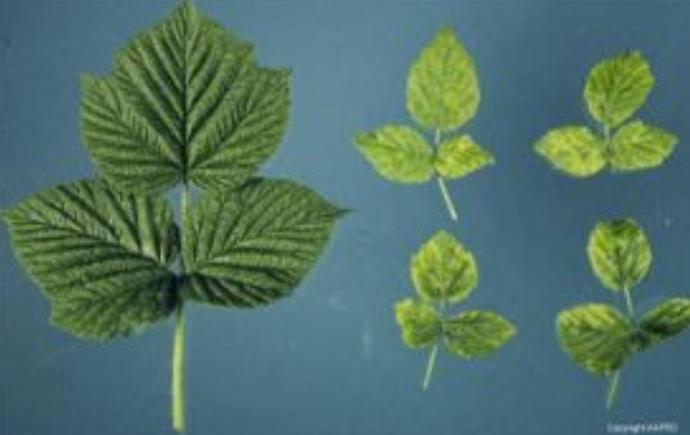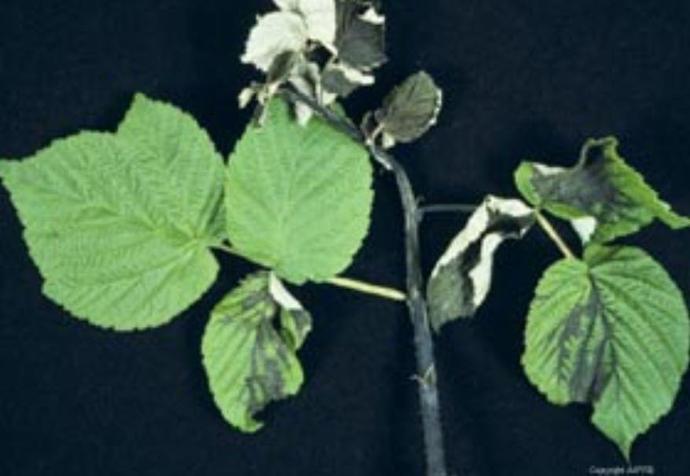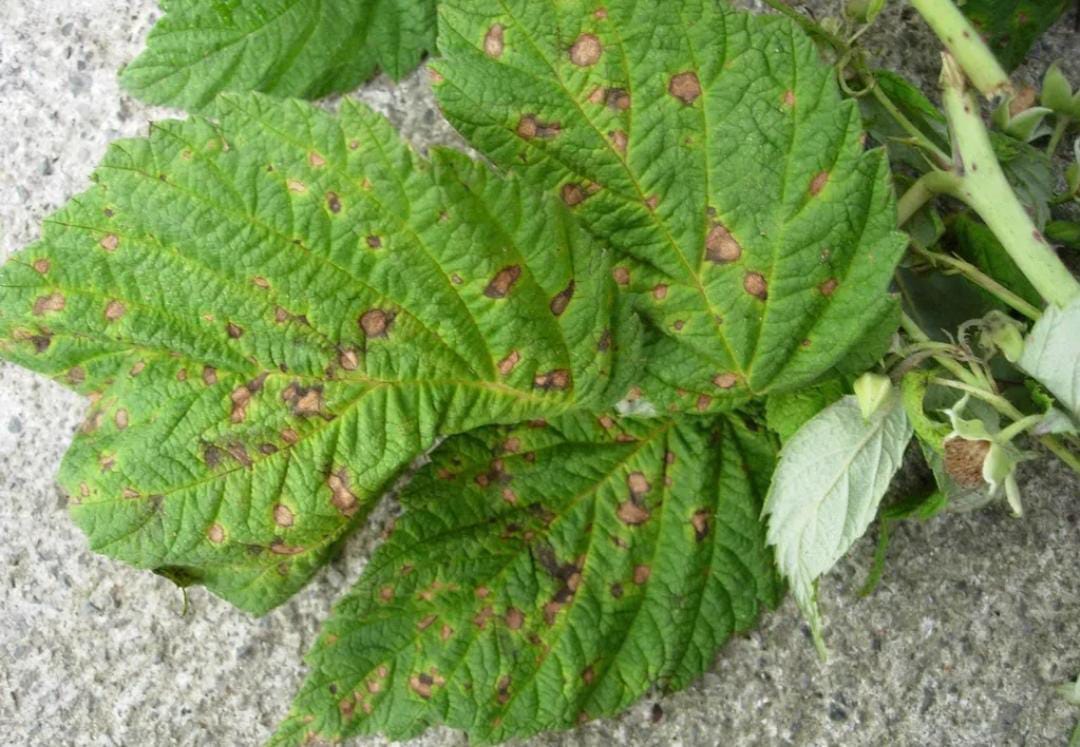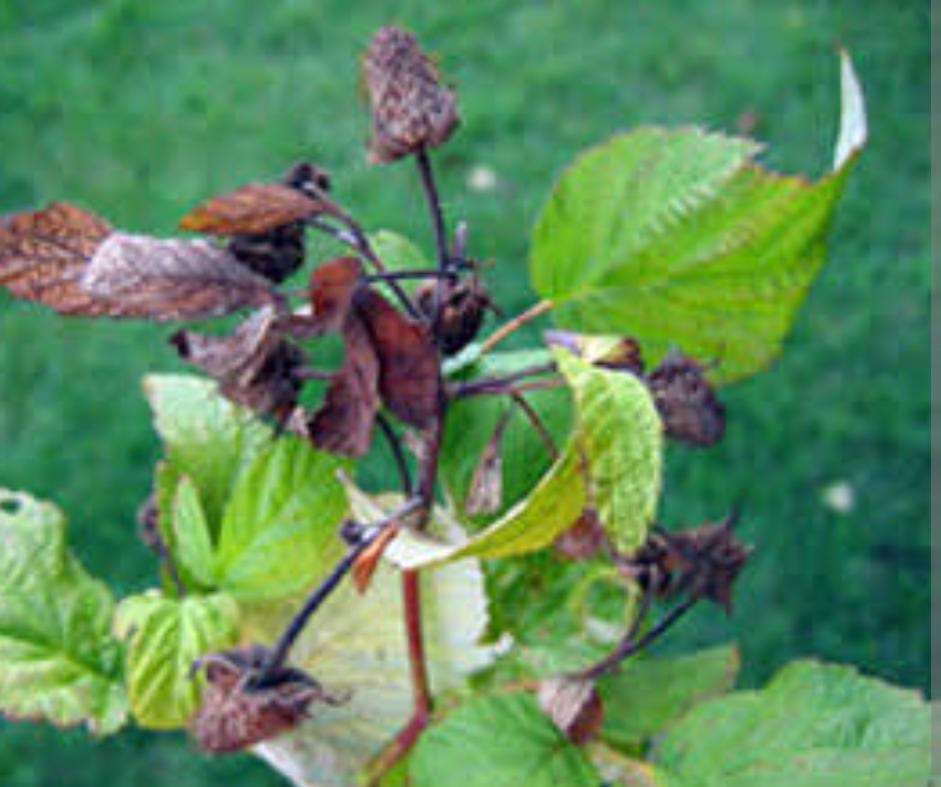Black Raspberry Shrub
Black raspberry shrubs, 3-6 feet tall in Zones 5-9, grow rapidly in well-drained soil under full sun to partial shade. Known for their dark and edible berries, black raspberries are popular in home gardens.
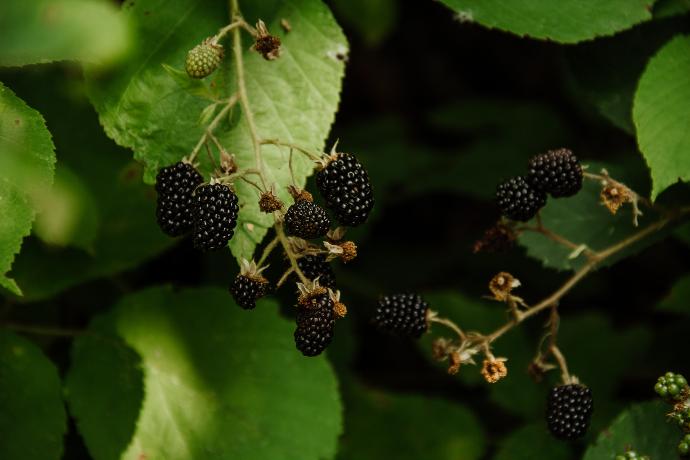
Habit
Tree
Height
1-2 m
Growth
Fast
Soil
Well-drained, moist
Shade
Full sun to partial shade
Moisture
Moderate
Edible
Yes
Medicinal
Yes
Origin
North America
Climatic Condition
Temperate
Temperature (°)
10-25°C
Humidity (%)
60-80%
Potting media
Loamy + Organic matter
Fertilizers
Balanced NPK (10:10:10)
Watering
Regular watering
Plant Weight
150-250 g
Flowering Time
Summer
Soil Ph level
5.5-6.5
Water Ph level
6.0-6.5
Soil EC
0.8 dS/m
Yield Per Plant
296 grams (1st harvest) , 814 grams(2 harvest)
NPK ratio
10:10:10
life Span
2-3 years
Health Benefits
Edible berries, high in vitamins
Suggested Grow Media or Potting Mix ?
50% loamy soil, 30% compost, 20% sand
Suggested Fertigation/Fertilizers
Fertilize every 4 weeks with a balanced fertilizer during growing season.
Common Diseases and Remedies
rasberry mosaic vairus, Fire Blight
leaf symptoms most evident during cool weather, can range from puckering, curling and crinkling, diseased plant parts become purplish black.
rogue and destroy virus-infected plants
HEALTH BENEFITS
· High in anthocyanins, which have anti-inflammatory properties.
· Supports heart health by reducing cholesterol and blood pressure.
· May help prevent cancer due to its high ellagic acid content
What Is A Black Raspberry ?
Black raspberry plant (Rubus occidentalis) is a raspberry plant that produces blood-red to black berries. Native to North America, this fruit is similar to red raspberries but has a unique taste and appearance. Black raspberries are often used in jams, jellies and desserts and can also be eaten fresh. These plants are perennial herbs that can grow up to 6 feet tall and have spiny vines and leaves. They need well-drained soil and full sun to thrive.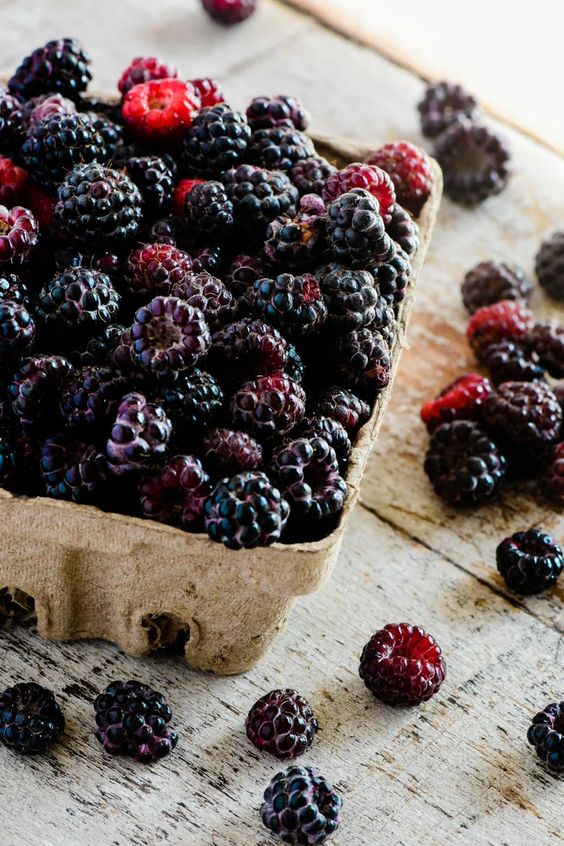
What Are The Different Types Of Raspberry
1. 'Bristow':
This variety is known for its large, sweet fruit and growth habit. It is resistant to diseases and pests, making it a popular choice for home gardeners.
2. "Jewel":
Black jewel raspberries are known for their large, firm berries and unique flavor. They are also resistant to diseases and pests.
3. "Munger":
Munger black raspberries are famous for their high yield and excellent taste. They are resistant to pests and diseases and are a popular choice among growers.
4. 'Mac Black':
Mac Black black raspberries are known for their large, sweet berries and growing habit. They are resistant to pests and diseases and are a popular choice for home gardeners.
5. 'Cumberland':
Cumberland black raspberries are known for their large, firm berries and exceptional flavor. They are resistant to pests and diseases and are a popular choice for home gardeners.
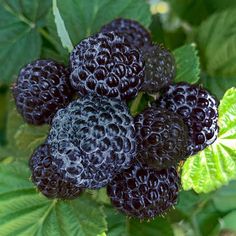
How To Care Black Raspberry
Location
Black raspberry plant (Rubus occidentalis) thrives in a variety of climates but generally prefers cool temperatures. They live in North America and are often found in the eastern and central parts of the country. They grow best in U.S. Department of Agriculture hardiness zones 4 through 8, which include areas where the average annual temperature is -30°F to 20°F (-34°C to -6°C).
Sun light
Black raspberry plants (Rubus occidentalis) need full sun to produce best fruit. This means they need at least 6-8 hours of direct sunlight per day. If you are growing black raspberry plants in your garden, choose a location that will receive full sun.
Soil
Black raspberry plant (Rubus occidentalis) likes good soil with a pH between 5.5 and 6.5. They grow best in soils rich in organic matter and well-drained. If your soil is heavy or clayey, you can increase drainage by adding straw or other organic matter to the soil before planting.
Hydration
Black raspberry plants (Rubus occidentalis) require consistent moisture to thrive, especially during the growing season when they produce fruit. They prefer soil that is evenly moist but not waterlogged. It's important to water your black raspberry plants regularly, especially during drought, to make sure they get enough water.When watering black raspberry plants, it is better to water shallowly and infrequently rather than watering shallowly and frequently. This encourages roots to grow deeper into the soil, helping the plant take in more water and nutrients. Water at the base of the plant rather than the top to avoid wetting the leaves, which increases the risk of disease.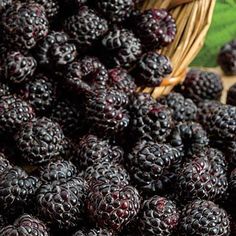
Nourishment
Black raspberry plants (Rubus occidentalis) need regular fertilization to ensure they have the nutrients they need to grow and produce fruit. Here are some tips for caring for black raspberry plants:
1. * Fertilizer:* Black raspberry plants benefit from regular fertilization, especially during the growing season. Use a balanced fertilizer (such as a 10-10-10 or 20-20-20 fertilizer) that contains equal amounts of nitrogen, phosphorus and potassium, or a fertilizer specifically designed for fruit or berries. Apply fertilizer according to manufacturer's instructions, usually every 4-6 weeks during the growing season.
2. * Organic Matter: * Adding organic matter to the soil helps increase soil structure and fertility. Add compost, well-rotted manure, or other organic matter to the soil before planting your black raspberry plant, and continue to add organic matter as mulch around the base of the plant each year.3. * pH: * Black raspberry plants prefer slightly acidic soil with a pH between 5.5 and 6.5. If your soil is too acidic or alkaline, you can adjust the pH by adding lime to raise the pH or sulfur to lower the pH. Perform a soil test to determine the pH of the soil and make any necessary amendments before planting.
4. * Water: * Black raspberry plants need constant moisture to thrive, especially during the growing season when they produce fruit. Water your plants regularly, especially during the dry season, to make sure they get enough water. Avoid overwatering as this can cause root rot and other problems.
Issues
Black raspberry plants (Rubus occidentalis) can be rewarding to grow, but like all plants, they can encounter problems. Here are some of the problems you may encounter when growing black raspberry plants and how to solve them:
1. *Diseases: *There are diseases such as root rot, powdery mildew and anthracnose in black raspberry plants. To prevent disease, choose disease-resistant plants, plant in well-drained soil and do not overwater. If you see symptoms of the disease, such as yellow leaves or leaf spots, remove and destroy affected plants and consider treating the fruit with fungicide.
2. * Pests: * Diseases such as aphids, spider mites and Japanese beetles are found on black raspberry plants. To prevent pest problems, monitor your plants regularly for pests and take action when necessary. You can eliminate pests by hand, spray plants with insecticide or neem oil, or use biological control methods such as ladybug or predatory mites.
What Are The Benefits Of Black Raspberry?
Black raspberry plant (Rubus occidentalis) has many culinary and medicinal uses. Here are some important benefits of the black raspberry plant:
1. * Nutritional value: * Black raspberries are rich in vitamins, minerals and antioxidants, making them more nutritious for your diet. They are rich in vitamin C, vitamin K, manganese and fiber, and also contain many antioxidants such as anthocyanins and ellagic acid.
2. * Culinary uses: * Black raspberries are fresh and delicious and can be used in many different ways. They are often used to make jams, jellies and preserves, as well as pies, tarts and other desserts. They can be used to make drinks such as smoothies, cocktails and tea.
3. * Medicinal Uses: * Black raspberries are believed to have many health benefits, including anti-inflammatory, anti-cancer and anti-aging properties. They are also used to treat many ailments such as sore throat, cough and digestive problems.
4. * Ornamental Use: * Black raspberry plants are valued for their ornamental qualities. It has beautiful leaves and flowers, and the berries add color to the garden. They can be planted as a hedge, border or focal point in the garden.
5. * Wildlife Attraction: * Black raspberry plants are also valued for their ability to attract wildlife. Berries are a favorite food of birds, including robins, thrushes and waxwings, as well as small animals such as squirrels and squirrels. These plants also provide shelter and food for many insects, including bees and butterflies.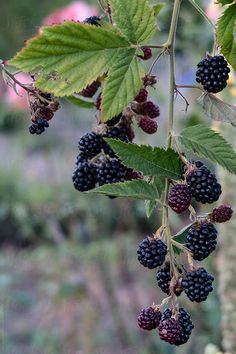
FAQs About Growing Black Raspberry?
1. How to care for black raspberry plants?
Black raspberry plant (Rubus occidentalis) management has many important tasks to ensure good growth and good yields of delicious berries. Here are some tips for managing black raspberry plants:
1. * Watering:* Black raspberry plants should be properly moistened, especially during the growing season when they bear fruit. Water your plants regularly, especially during the dry season, to make sure they get enough water. Avoid overwatering as this can cause root rot and other problems.
2. * Fertilization: * Black raspberry plants benefit from regular fertilization, especially during the growing season. Use a balanced fertilizer (such as a 10-10-10 or 20-20-20 fertilizer) that contains equal amounts of nitrogen, phosphorus and potassium, or a fertilizer specifically designed for fruit or berries. Apply fertilizer according to manufacturer's instructions, usually every 4-6 weeks during the growing season.
3. *Pruning: *Regular pruning promotes healthy growth and fruit production of black raspberry plants. Remove dead or diseased insects, as well as overcrowded or overcrowded insects. After fruiting, usually in late summer or early fall, prune the canes back to the ground.
2. What is the use of black raspberry plant?
The black raspberry plant (Rubus occidentalis) has many uses, including food and medicine. Some of the most common uses of the black raspberry plant include:
1. * Culinary uses:* The black fruit is delicious when eaten fresh and can be used in many types of cooking. They are often used to make jams, jellies and preserves, as well as pies, tarts and other desserts. They can be used to make drinks such as smoothies, cocktails and tea.
2. * Medicinal use: * Black raspberries are rich in antioxidants, vitamins and minerals, making them a popular choice in herbal medicine. They are thought to have many health benefits, including immunity, protection against cancer and anti-aging. They are also used to treat many ailments such as sore throat, cough and digestive problems.
3. Ornamental Use: Black raspberry plants are also valuable for their ornamental qualities. It has beautiful leaves and flowers, and the berries add color to the garden. They can be planted as a hedge, border or focal point in the garden.
4. *Wildlife Attraction: *Black raspberry plants are also valued for their ability to attract wildlife. Berries are a favorite food of birds, including robins, thrushes and waxwings, as well as small animals such as squirrels and squirrels. These plants also provide shelter and food for many insects, including bees and butterflies.
3. Can I grow black raspberries at home?
Yes, you can grow black raspberry plants (Rubus occidentalis) in your home, but it is important to provide them with the right growing conditions. Here are some tips for growing a black raspberry tree indoors:
1. Light: Black raspberry plants need full sun to produce best fruit, so choose a spot in your home that gets full sun all day. If you don't have a sunny spot, you can use natural lighting to add natural sunlight.
2. * Temperature: * Black raspberry plants prefer cool temperatures, preferably between 60°F to 70°F (15°C to 21°C). Do not place it near a heater or heater as it will cause the plant to overheat.
3. * Terrain: * Use the best machine specially designed for fruit or small fruits. Make sure the container has a drain to prevent water from leaking to the bottom.
4. * Watering:* Black raspberry plants need constant moisture to thrive; so water regularly, especially during the growing season when they produce fruit. Water at the base of the plant rather than the top to avoid wetting the leaves, which increases the risk of disease.
4. What type of pot is best for growing black raspberries?
When choosing a pot to grow your black raspberry plant (Rubus occidentalis) at home, it is important to choose a container that has enough room for the plant's roots to grow and provide good fluids. Here are some tips for choosing the best pot for growing black raspberry plants:
1. * Size: * Choose a pot that is at least 18 inches (45 cm) in diameter and 12 inches (30 cm) deep. This will provide enough room for the plant's roots to grow and will help prevent the plant from sprouting.
2. * Materials: * Choose a pot made of durable materials such as plastic, ceramic or terracotta. Do not use metal pots as they can overheat in direct sunlight and damage plants.
3. * Water: * Make sure there is a drain at the bottom of the pot to drain excess water. This will help prevent water from collecting at the bottom of the pot and causing root rot on the plant.
4. Weight: When choosing a pot to grow black raspberry plants at home, consider the weight of the pot. Heavy pots can be easily moved, especially if you need to move your plants to another location to get more sunlight.
5. Good: Choose a tree that beautifies your home and is pleasing to the eye. You can find plants in a variety of colors, shapes and patterns to suit your personal taste.
5. Where can I buy black raspberry plants?
You can buy black raspberry plants (Rubus occidentalis) from many places, including nurseries, garden centers and online stores. Here are some options for purchasing black raspberry trees:
1. * Local nurseries and nurseries: * Many local nurseries and nurseries grow black raspberry plants, especially in spring and summer. Visit your local nursery or garden center to see if they have black raspberry plants available for purchase.
2. * Online stores:* You can buy black raspberry trees online from stores such as Amazon, eBay and Etsy. Many online stores carry a wide selection of black raspberry plants in different varieties and sizes.
3. * Specialty Fruit Nursery: * There are also private nurseries that specialize in fruit plants, including black raspberry plants. These nurseries usually have many varieties and sizes to choose from.
4. * Local Farm Markets: * Some local farm markets also sell black raspberry trees, especially during the spring and summer months. Visit your local grocery store and see if there are any vendors selling black raspberry plants.
5. Seed Catalogs: Black raspberry plants are also available for sale in some seed catalogs, but there may be a small number. Check out black raspberry plant seed catalogs from companies like Burpee, Johnny's Selected Seeds, and Gurney's.
